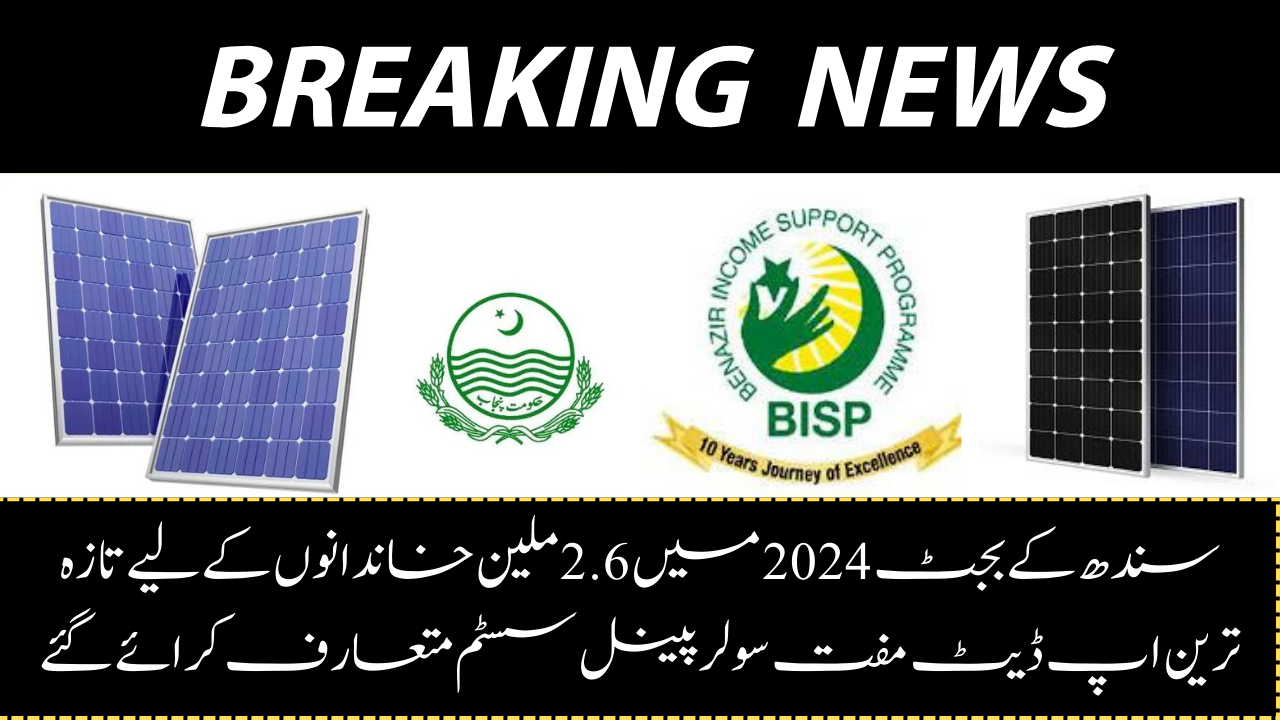Free Solar Panel Systems
In a significant move towards sustainable energy and alleviating energy poverty, the Government of Sindh has announced a landmark initiative to provide free solar panel systems to 2.6 million families. This ambitious project is part of the Sindh Budget 2024, reflecting the provincial government’s commitment to renewable energy and enhancing the quality of life for its residents.
Addressing Energy Challenges
Sindh, a province grappling with frequent power outages and unreliable electricity supply, has seen its citizens suffer due to inconsistent access to energy. These issues have had a detrimental impact on daily life and economic activities, particularly in rural areas. The introduction of free solar panel systems aims to mitigate these challenges, providing a stable and sustainable energy source to millions of households.
Economic and Environmental Benefits
The initiative is expected to yield numerous economic and environmental benefits. By harnessing solar energy, the government aims to reduce the province’s dependency on non-renewable energy sources, thereby cutting down on greenhouse gas emissions. This shift towards clean energy will not only help in combating climate change but also promote environmental sustainability.
Economically, the provision of free solar panels is anticipated to reduce household energy expenditures significantly. Families will save on their electricity bills, allowing them to allocate their financial resources to other essential needs such as education, healthcare, and nutrition. Additionally, the initiative is poised to create job opportunities in the renewable energy sector, fostering economic growth and development in the region.
Implementation Strategy
The Sindh government has outlined a comprehensive implementation strategy to ensure the successful deployment of solar panel systems across the province. The project will be rolled out in phases, starting with the most underserved and remote areas where the need for reliable electricity is most acute.
A dedicated task force comprising experts in renewable energy, project management, and community engagement will oversee the implementation. This task force will coordinate with local authorities, community leaders, and non-governmental organizations (NGOs) to ensure the smooth execution of the project.
Selection Criteria
To identify the 2.6 million beneficiary families, the government will employ a transparent and inclusive selection process. Priority will be given to low-income households, particularly those in rural and peri-urban areas. The selection criteria will also consider factors such as household size, current access to electricity, and overall socioeconomic status.
Technology and Infrastructure
The solar panel systems to be distributed under this initiative will be state-of-the-art, high-efficiency units capable of meeting the average household’s energy needs. Each system will include solar panels, an inverter, batteries for energy storage, and necessary wiring and mounting hardware.
To support the installation and maintenance of these systems, the Sindh government will establish a network of service centers across the province. These centers will be staffed by trained technicians who will provide ongoing support and maintenance services to ensure the longevity and optimal performance of the solar panel systems.
Training and Capacity Building
Recognizing the importance of local capacity building, the Sindh government will also invest in training programs for community members. These programs will equip residents with the skills needed to install, operate, and maintain solar panel systems. By fostering local expertise, the government aims to ensure the sustainability of the initiative and empower communities to take ownership of their energy solutions.
Monitoring and Evaluation
A robust monitoring and evaluation framework will be implemented to track the progress and impact of the project. Regular assessments will be conducted to measure key indicators such as energy savings, reduction in greenhouse gas emissions, and improvements in the quality of life for beneficiary families. Feedback from the community will be actively sought to identify areas for improvement and ensure that the initiative meets its objectives.
Challenges and Mitigation
While the initiative promises significant benefits, it is not without challenges. Potential obstacles include logistical issues in reaching remote areas, technical difficulties in system installation and maintenance, and ensuring the timely procurement and distribution of equipment.

To address these challenges, the Sindh government will adopt a proactive approach, leveraging technology and innovation. For instance, advanced mapping and planning tools will be used to optimize the logistics of equipment delivery and installation. Partnerships with experienced solar energy companies and NGOs will be established to bring technical expertise and best practices to the project.
Conclusion
The introduction of free solar panel systems for 2.6 million families in Sindh marks a pivotal step towards a sustainable and equitable energy future for the province. This initiative not only addresses the immediate energy needs of millions of households but also contributes to long-term economic and environmental goals.
By investing in renewable energy and empowering communities, the Sindh government is laying the foundation for a more resilient and prosperous province. As the project unfolds, it is expected to serve as a model for other regions, demonstrating the transformative potential of clean energy solutions in improving lives and fostering sustainable development.
